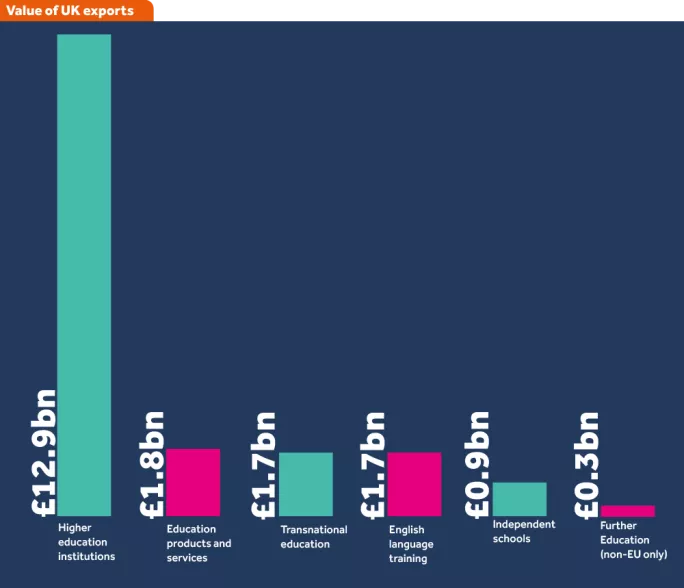Why the UK apprenticeship model is now a global export

Ask anyone to name a gold-standard apprenticeship system and, chances are, a few familiar countries will crop up.
Germany would likely be there, where half of young people complete some form of apprenticeship training. Maybe Switzerland, whose economy regularly tops global competiveness tables, thanks largely to its skilled workforce. Or perhaps Finland, whose apprenticeships model particularly helps adults retrain or upskill.
But despite the criticism the apprenticeship and skills system in the UK has faced, it seems governments across the world - from the US to France and China - are now also looking to Britain with its reformed apprenticeship system for ideas on how to kick-start their own skills revolution.

The skills sector lags behind compared to other parts of the education system in terms of its export value. The latest figures show that further education exports account for only 2 per cent of the UK’s total educational exports - a figure that fell by almost two thirds in the five years to 2015. FE is dwarfed by higher education, which accounts for 67 per cent of the total.
‘Stolen’ idea
The burgeoning international appetite for apprenticeships could therefore be an opportunity for the sector to increase its export potential. In November 2016, then US president Barack Obama signed a proclamation declaring the first National Apprenticeships Week in the USA.
The idea was reportedly borrowed from the UK, after a trip by former secretary of labour Tom Perez to London, which fell during the UK’s National Apprenticeship Week. Perez was apparently so impressed with the idea, he told Obama that the US should have its own.
“It was a British idea they have stolen from us,” says Tom Bewick, who accompanied the secretary on the trip. An advisor to the last Labour government on industrial training policy, Bewick went on to advise the US Department of Labor on apprenticeships.
Bewick founded the Transatlantic Apprenticeship Exchange Forum (TAEF) in 2015, which works with just shy of a dozen UK training providers, helping them export elements of their apprenticeships provision.

“You have to step out of your own system to evaluate it and see both its strengths and its weaknesses,” Bewick says. Despite apprenticeships going through a “challenging time” with the introduction of the levy last April and the subsequent dramatic fall in apprenticeship starts, he believes Britain is still well-placed to achieve a high percentage of young people taking the “learn and earn” route.
He said degree apprenticeships were going to be the “sweet spot” for the American market, because having a degree is “even more pervasive over here,” Bewick adds.
Last June, Donald Trump signed an executive order doubling the budget for apprenticeship grants to $200m (£144m), later approved by Congress. His administration also announced a “moonshot goal” of achieving 5 million apprenticeships, only 2 million more than the UK government’s own target on starts by 2020.
But with a workforce five times as large as Britain’s, this is a perhaps less of a “moonshot” than it first appears. In the US, apprentices make up only 0.2 per cent of the workforce, compared to nearly 3 per cent in the UK. But this is still dwarfed by Germany and many other countries in the rest of Europe.
Yet it is Britain’s flexible labour market and its proliferation of independent training providers, or “intermediary workforce players” as they are known in US, which makes the UK more attractive in some respects than Germany, Bewick says.
“The UK sector does not realise the expertise they have which is ripe for exporting, whether its end-point assessments or e-portfolios, which could be exported abroad, particularly as businesses in the US are used to buying in ‘business solutions’”.
It is not just America which is looking to the UK’s apprenticeships system. In 2013, the Chinese Ministry of Education chose Britain as a country to emulate as part of an apprenticeships piloting programme. This included a college in Shanghai using UK apprenticeship frameworks and curriculums.
On a recent visit to Shanghai as part of preparation for the 2021 WorldSkills competition, Dr Neil Bentley, chief executive of WorldSkills UK, says it was clear from conversations with officials that China is very interested in learning from the UK’s education and training system. “This is particularly around our apprenticeship standards but also crucially how we encourage and enable creative approaches to thinking across all industries,” he adds.
Euan Blair, chief executive of WhiteHat - a tech start-up that helps link young people to find apprenticeship opportunities - says a number of countries are looking at the UK model and exploring launching something similar.
“We work with a range of international companies who are keen to explore how to expand apprenticeship programmes they’ve launched on the back of the levy to other countries. We’re currently working on a new apprenticeship scheme that would see apprentices spend six months of their programme in California and six months in London,” he says.
Blair adds: “We’ve been in regular contact with the French Embassy - and a delegation of government officials from Belgium is attending a roundtable at our offices next month.” He adds that countries as wide ranging as South Africa and Malaysia are exploring how to use apprenticeships more effectively.
Apprenticeships and skills minister Anne Milton says that it is “great to hear that other countries are inspired by the fantastic apprenticeships on offer here in England”
“We have changed apprenticeships so they are flexible, high quality and led by the demands of industry - and I have seen the positive impact this has on apprentices and employers across the country.
“Apprenticeships are not only giving employers the skills they need to grow, they are also giving people a real alternative to traditional academic study so they can benefit from the excellent career prospects that they offer.”
You need a Tes subscription to read this article
Subscribe now to read this article and get other subscriber-only content:
- Unlimited access to all Tes magazine content
- Exclusive subscriber-only stories
- Award-winning email newsletters
Already a subscriber? Log in
You need a subscription to read this article
Subscribe now to read this article and get other subscriber-only content, including:
- Unlimited access to all Tes magazine content
- Exclusive subscriber-only stories
- Award-winning email newsletters